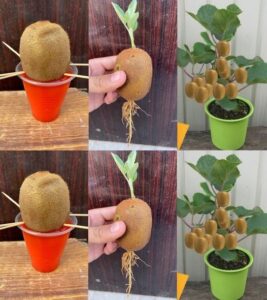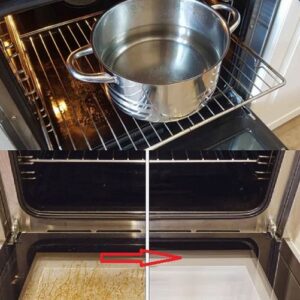For many, the term “kiwi” immediately conjures images of the sweet, tangy flesh of the fruit. But did you know you can cultivate this delectable delight right in your own backyard, even in a container? Here’s your comprehensive guide on how to grow Kiwi in pots.
Introducing Hardy Kiwis:
Known to be smaller than their common counterparts, hardy kiwis are a common find in stores. Unique to these fruits is their dioecious nature, which requires planting at least one male for every 8-10 female plants to ensure fruiting.
If you’re a novice, the Ananasnaya variety is a great starting point due to its robust growth and aromatic fruits. For earlier yields, go with the Geneva variety. Dumbarton Oaks is prized for high yields, Michigan State for cold-resistance and larger fruits, Ken’s Red for its striking appearance, and Issai as a self-fertile variant.
Kiwi Propagation: Seed or Cutting?
Both seeds and cuttings can be used, but note that fruiting will typically take 3-5 years. While seeds are easily available, cuttings often yield superior plants. If you’re aiming for fruiting, ensure both male and female plants are present.
Pro-tip: For a quicker start, pick a self-pollinating potted plant from a nursery.
Choosing Your Container:
Kick off with a 12-14 inch pot with good drainage. As the vine matures, you may need to transfer it to a bigger container, handling the root ball with care.
Supporting Your Kiwi:
Kiwi vines, potentially reaching lengths of 25-30 feet, need robust support. Consider patio overboards, sturdy trellises, or even balcony and rooftop setups.
Essentials for Potted Kiwis:
Soil: Aim for well-draining, organically rich soil with a pH balance tilting slightly acidic to mildly alkaline.
Location: A daily dose of 5-6 hours of sunlight ensures a thriving plant.
Temperature: For colder areas, a 40º-60º F range is ideal; warmer regions should maintain 56º-77º F. Protect young plants from temperatures below 14º F.
Watering: Consistent soil moisture is key, but avoid overwatering.
Fertilization: Once established, a balanced fertilizer, like 16-16-16 applied 2-3 times annually, suffices.
Caring for Your Vine:
Pruning: Annual pruning is crucial. Female plants in winter, and male plants post-flowering.
Mulching: A compost or leaf mix retains moisture but keep it away from the vine’s base.
Pest/Disease: Kiwis are relatively hardy. If issues pop up, neem oil is a good organic solution. If you have pets, especially cats, safeguard your plant.
Overwintering: Mature plants can withstand -15 F, but young ones benefit from winter protection. Indoors, wrap the stems and ensure some light exposure.
Reaping the Rewards:
Plants grown from seeds generally fruit in three years, though some varieties, like the Arctic, fruit sooner. A mature vine can yield up to 40-50 pounds annually for decades!
Ripe fruits are slightly soft. Once harvested, they can stay fresh in a fridge for around five weeks.
With this guide, you’re equipped to embark on your kiwi-growing journey right at home! Enjoy the fruits of your labor and the joy of gardening.






